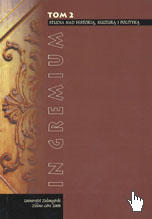Abstrakt
HUMANISM AND ROYAL EDUCATION OF HENRY VIII’ CHILDREN
S u m m a r y
With the advent of humanism in England, native scholars were increasingly aware that if they were to be successful, the two distinct fields in which they had to inculcate humanistic ideas were the king’s court and the universities. In order gain authorisation to practise in the lecture rooms and to encourage their students to take an interest in the study of both Latin and Greek, and expose their listeners to uncorrupted and original classical texts, English humanists had to obtain royal approval of this new approach to teaching. In order to persuade the monarch around to their way of thinking, understanding the world, interpreting the Bible and teaching future generations, they had to prove that their capabilities and intellectual capacity outstripped those of their competitors - the old-fashioned lecturers from medieval monasteries. The prime sensitive area in which humanists could achieve their goals and make their influence felt was the education of the sovereign’s children.
The principal aim of this paper is to offer an insight into the detail of educating the king’s offspring in Tudor times. There is no dispute amongst most historians that the kind of education a prince or princess underwent and the religion instruction they received in their youth, are the two most determining factors which influence the future king’s or queen’s reign. Thus this paper allows the reader to learn of certain nuances affecting the royal Tudor education provided by the English scholars to Henry VIII’ children – viz. the Princesses Mary and Elizabeth as well as Prince Edward.
Bibliografia
Beaufort M., The mirroure of golde for the sunfull soule, London 1522.
Desiderius Erasmus Roterodamus, Christiani matrimonii Institutio, Basle 1526.
Desiderius Erasmus Roterodamus, Opus Epistolarum Des. Erasmi Roterodami, Ed. P.S. i H.M. Allen, H.W. Garrod. 1906-1958.
Duwes G., An Introductorie for the lerne to rede, to pronounce, and to speake frenche trewly, Godfray 1533-1536.
Morus T., The Works of Sir Thomas More, London 1557.
Vives J., De Institutione Foeminae Christianae, Antwerp 1523.
Vives J., De Ratione Studii Puerilis, Antwerp 1523.
Vives J., Satellitium vel Symbola, Louvain 1524.
II. Opracowania
Adams R. P., The Better Part of Valor, Seattle 1962.
Croft H.H.S., The book named governour by Thomas Elyot, New York 1967.
Daniell Ch., A Traveller’s History of England, Gloucestershire 1996.
Dolan J.P., The Essential Erasmus, („Enchiridion”, „Moria”, „Querela Pacis”, „De Immensa Misericordia Dei” and other works), New York 1964.
Haigh Ch., Elizabeth I, Profiles in Power, New York 1988.
Mattingly G., Catherine of Aragon, Boston 1941.
McConica J.K., English humanists and Reformation politics under Henry VIII and Edward VI, Oxford 1965.
Mumby F.A., The girlhood of Queen Elizabeth, a narrative contemporary letters, London 1909.
Nichols J.G., Literary Remains of King Edward VI, New York 1964.
Simon J., Education and Society in Tudor England, Cambridge 1966.
Watson F., Vives and the Renascence Education of Women, London 1912.
III. Artykuły i serwisy internetowe
Encarta®Online Encyclopedia na http://uk.encarta.msn.com, chapter „Parentage, childhood, and early life”.
http://www.Elizabethan-era.org.uk: „Education of Queen Elizabeth I”
http://www.elizabethi.org/us/elizabethianchurch/queenandchurch.html

